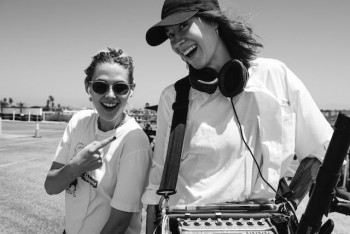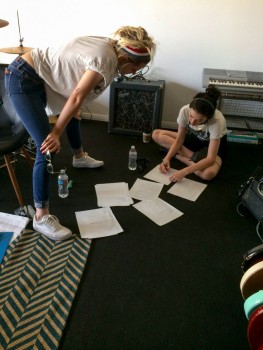Click on pics for full view.
If you've ever been on a film set, you know that production sound recordists have a bit of a reputation. Dedicated to capturing the detailed music of film narrative, the sound recordist has one of the more tedious jobs on a movie. It's a thankless role in a lot of ways — people rarely compliment the crisp sound on a picture, but you can bet viewers complain if audio is askew. Amanda Beggs, who performed the role on Kristen Stewart's directorial debut, Come Swim for Refinery29's Shatterbox Anthology, carries the role with pride.
"As a sound mixer, I am actor's number-one ally," Beggs tells me over the phone. "My goal is to capture performance." She first met Stewart on the set of Camp X-Ray, a 2014 film about soldiers stationed at Guantanamo. When Beggs explains her position for me — I do not pretend to understand the intricacies of a film set — she uses the Shatterbox director as an example.
"[Kristen Stewart] gives her all when she goes into it to perform for whatever role," Beggs explains. "If she's giving 110%, you don't want to come up to her and say, 'Oh, actually, we didn't really get that line' or, 'We kinda missed it' or, 'It sounded a little soft, can we do it again?'" Stewart ran into Beggs at a party in L.A. years after Camp X-Ray and recruited the sound mixer for her project with Refinery29.
Come Swim is an impressionistic portrait of anxiety, imagination, and darkness — as such, it's not a particularly dialogue-heavy film, which lent Beggs some creative freedom. (Dialogue, it seems, is the leash that binds the sound designer.)
"I got to play around in a way that I don't normally get to on a feature," she tells me of the experience. "Any other creative thing, like, 'Oh, I want to put this mic here and get this cool sound effect,' or, 'What if we tried to film in this other room and listen to the sound through the door?'...you don't usually get the opportunity, or the time, [to do]."
Beggs has been working as a sound mixer for almost a decade — by film standards, this isn't very long, but the 30-year-old has the résumé of a seasoned veteran. A graduate of the Savannah College of Art and Design, she started working professionally before she even finished school. (In fact, she tells me that she technically graduated while on a fishing boat in Costa Rica.) Some of her more notable projects include a tiny film called Star Wars: The Force Awakens and the recent critical darling 20th Century Women. Two years ago, she was inducted into the Cinema Audio Society, a guild that has but a handful of woman production sound mixers. Beggs is uniquely young for her accomplishments — she tells me that crew members often remark on her age — but she's also an outlier because she's a woman. The fact is that men often occupy many of the behind-the-scenes roles in the film industry. A recent report found that the number of women behind the camera hasn't budged since 1998.
When I ask her about the rarity of female sound mixers, she sighs and gives a weathered laugh.
"If I had a dollar for every time a producer, another crew member, or an actor told me that I was the first female sound designer..." She doesn't finish the statement.
Why aren't more women hopping to the other side of the lens? Beggs theorizes that it's because the role is so technical. Sound designers are expected to own and manage their own equipment, especially when they first begin working.
"Specifically sound — you really do have to know the ins and outs of your equipment," Beggs admits. "You have to have a mind to work around problems and problem-solve and work with whatever equipment you have, and unfortunately young girls aren't steered toward technical-based hobbies."
She mutters a bit about the reputation of sound departments, specifically — from what I can glean — that sound people are generally the goody two-shoes of the film set. Beggs references popular "jokes" about her department. (She won't share any specific ones with me, but a quick Google search gives me a couple of gems on Reddit.)
"They just don't understand what it takes to get our job done," she intones, mock-primly, at the jokesters.
As she points out: "People are willing to forgive a bag image, but bad sound is something you really can't come back from." Audio is important, so it's okay to be a bit of a stickler.
Beggs expects that she won't always be that token "first female" on sound. Just in her relatively short time in the industry, she's noticed a change. "Especially in the camera department and in sound, there's more and more women, just in the 10 years that I've been doing this — there's definitely a change happening," she tells me. It's about damn time.



No comments:
Post a Comment
What do you think of this?